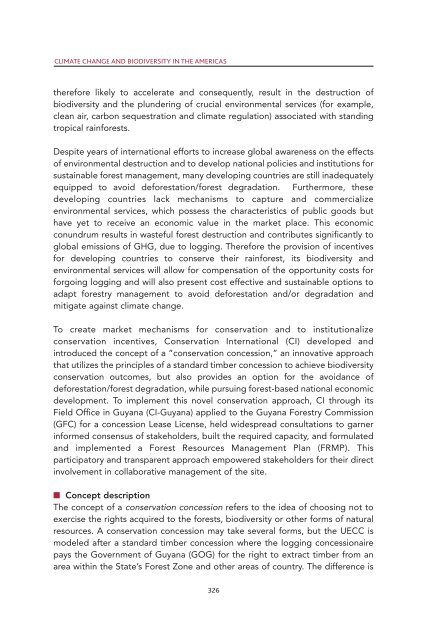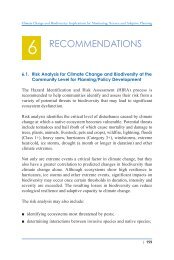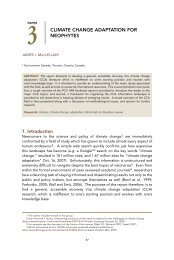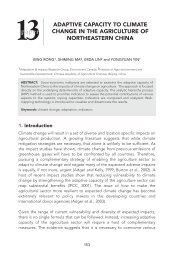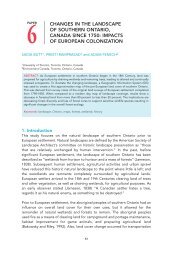Paper 17: Case Study on the Upper Essequibo ... - UPEI Projects
Paper 17: Case Study on the Upper Essequibo ... - UPEI Projects
Paper 17: Case Study on the Upper Essequibo ... - UPEI Projects
Create successful ePaper yourself
Turn your PDF publications into a flip-book with our unique Google optimized e-Paper software.
CLIMATE CHANGE AND BIODIVERSITY IN THE AMERICAS<br />
<strong>the</strong>refore likely to accelerate and c<strong>on</strong>sequently, result in <strong>the</strong> destructi<strong>on</strong> of<br />
biodiversity and <strong>the</strong> plundering of crucial envir<strong>on</strong>mental services (for example,<br />
clean air, carb<strong>on</strong> sequestrati<strong>on</strong> and climate regulati<strong>on</strong>) associated with standing<br />
tropical rainforests.<br />
Despite years of internati<strong>on</strong>al efforts to increase global awareness <strong>on</strong> <strong>the</strong> effects<br />
of envir<strong>on</strong>mental destructi<strong>on</strong> and to develop nati<strong>on</strong>al policies and instituti<strong>on</strong>s for<br />
sustainable forest management, many developing countries are still inadequately<br />
equipped to avoid deforestati<strong>on</strong>/forest degradati<strong>on</strong>. Fur<strong>the</strong>rmore, <strong>the</strong>se<br />
developing countries lack mechanisms to capture and commercialize<br />
envir<strong>on</strong>mental services, which possess <strong>the</strong> characteristics of public goods but<br />
have yet to receive an ec<strong>on</strong>omic value in <strong>the</strong> market place. This ec<strong>on</strong>omic<br />
c<strong>on</strong>undrum results in wasteful forest destructi<strong>on</strong> and c<strong>on</strong>tributes significantly to<br />
global emissi<strong>on</strong>s of GHG, due to logging. Therefore <strong>the</strong> provisi<strong>on</strong> of incentives<br />
for developing countries to c<strong>on</strong>serve <strong>the</strong>ir rainforest, its biodiversity and<br />
envir<strong>on</strong>mental services will allow for compensati<strong>on</strong> of <strong>the</strong> opportunity costs for<br />
forgoing logging and will also present cost effective and sustainable opti<strong>on</strong>s to<br />
adapt forestry management to avoid deforestati<strong>on</strong> and/or degradati<strong>on</strong> and<br />
mitigate against climate change.<br />
To create market mechanisms for c<strong>on</strong>servati<strong>on</strong> and to instituti<strong>on</strong>alize<br />
c<strong>on</strong>servati<strong>on</strong> incentives, C<strong>on</strong>servati<strong>on</strong> Internati<strong>on</strong>al (CI) developed and<br />
introduced <strong>the</strong> c<strong>on</strong>cept of a “c<strong>on</strong>servati<strong>on</strong> c<strong>on</strong>cessi<strong>on</strong>,” an innovative approach<br />
that utilizes <strong>the</strong> principles of a standard timber c<strong>on</strong>cessi<strong>on</strong> to achieve biodiversity<br />
c<strong>on</strong>servati<strong>on</strong> outcomes, but also provides an opti<strong>on</strong> for <strong>the</strong> avoidance of<br />
deforestati<strong>on</strong>/forest degradati<strong>on</strong>, while pursuing forest-based nati<strong>on</strong>al ec<strong>on</strong>omic<br />
development. To implement this novel c<strong>on</strong>servati<strong>on</strong> approach, CI through its<br />
Field Office in Guyana (CI-Guyana) applied to <strong>the</strong> Guyana Forestry Commissi<strong>on</strong><br />
(GFC) for a c<strong>on</strong>cessi<strong>on</strong> Lease License, held widespread c<strong>on</strong>sultati<strong>on</strong>s to garner<br />
informed c<strong>on</strong>sensus of stakeholders, built <strong>the</strong> required capacity, and formulated<br />
and implemented a Forest Resources Management Plan (FRMP). This<br />
participatory and transparent approach empowered stakeholders for <strong>the</strong>ir direct<br />
involvement in collaborative management of <strong>the</strong> site.<br />
■ C<strong>on</strong>cept descripti<strong>on</strong><br />
The c<strong>on</strong>cept of a c<strong>on</strong>servati<strong>on</strong> c<strong>on</strong>cessi<strong>on</strong> refers to <strong>the</strong> idea of choosing not to<br />
exercise <strong>the</strong> rights acquired to <strong>the</strong> forests, biodiversity or o<strong>the</strong>r forms of natural<br />
resources. A c<strong>on</strong>servati<strong>on</strong> c<strong>on</strong>cessi<strong>on</strong> may take several forms, but <strong>the</strong> UECC is<br />
modeled after a standard timber c<strong>on</strong>cessi<strong>on</strong> where <strong>the</strong> logging c<strong>on</strong>cessi<strong>on</strong>aire<br />
pays <strong>the</strong> Government of Guyana (GOG) for <strong>the</strong> right to extract timber from an<br />
area within <strong>the</strong> State’s Forest Z<strong>on</strong>e and o<strong>the</strong>r areas of country. The difference is<br />
326


